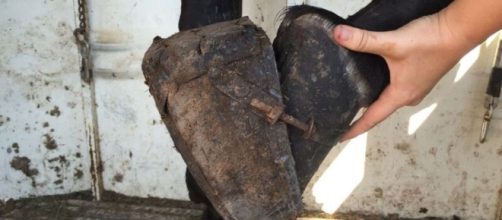Horse soring is a cruel infliction of the animal’s legs or hooves with intent. Such pain causes the animal to engage in an exaggerated, artificial gait. The injuries can be caused by the use of pads, chains, stacks, caustic chemicals and other devices applied to the horse’s limbs and their hooves, resulting in extreme injury, pain, and suffering. These methods are used to make the horse more visually appealing for competition in shows, sales, and auctions without any regard for the pain and discomfort of the animal. Congress passed the Horse Protection Act years ago with the intent to stop these practices, yet Horses are still suffering.
Horse soring continues despite laws and USDA efforts
After the proposal of the Horse Protection Act, its passage and enforcement met budgetary issues and inadequate funding. The Act, announced by the U. S. Department of Agriculture (USDA) and the Animal & Plant Health Inspection Service (APHIS) was designed to help protect horses from cruel soring practices. However, rather than banning horse soring, horse industry organizations (HIOs) devised a system of training their own inspectors to examine the animals for any visible horse soring prior to a showing. Despite all efforts, soring is still a major concern throughout several states like Kentucky, Tennessee, and others in the southeast United States.
Trump Administration puts issue on hold
A memo surfaced at the White House stating that the regulation aimed at banning the practice of horse soring during the final days of the Obama Administration be put on hold. Just a week prior to Trump taking office, the USDA finalized the new regulation and updates to the Horse Protection Act, but on his first day in office, President Trump placed a hold on the soring ban. Senior adviser Keith Dane states that this is just one of dozens of other proposed rules the Trump Administration froze, but this doesn’t mean the soring ban is dead. The hope is that the issue will again be reviewed and passed. Neither the Agriculture Department nor the White House will comment further on this matter.

